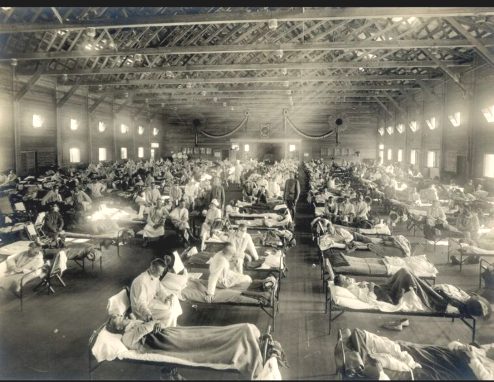Covid-19: History Recalls How Nigeria Lose 500,000 People To 1918 Spanish Flu Epidemic

LAGOS MAY 4TH (NEWSRANGERS)- People with little or no knowledge of history become jittery when they are confronted by challenging events. Jamaican political activist Marcus Garvey said “a people without the knowledge of their past history, origin and culture is like a tree without roots.”
In the past six months, the world has been battling COVID-19, but what is happening presently is not new, Nigeria and the rest of the world have seen here before. From 1918-1920, an influenza epidemic caused by an H1N1 virus with a gene of avian origin ravaged the world. 1918 also marked the end of World War 1 which lasted from July 1914 to November 1918. When the world thought the storm was over, the influenza also known as Spanish flu hit the world and killed an estimated 50 million people, more than those killed in the war.
Like COVID-19, the influenza was circulated worldwide through human mobility, especially via sea transportation. Nigeria recorded an outbreak on September 14, 1918, four years after the 1914 amalgamation of the southern and northern protectorate that formed what is now called Nigeria by Lord Lugard the Governor-General of Nigeria.
According to Public Record Office (PRO), London, Spanish flu was imported into Lagos through the SS Panayiotis ship. The ship was ‘arrested’ and disinfected by the sanitary authority and subsequently sent to the pool, an isolated area where all disinfected ships are kept. By mid-September, all the merchant ships anchored in Lagos were infected.
Another ship, SS Bida which left Gold Coast (now Ghana) for Lagos was later identified as “the chief means introducing the influenza to Nigeria”. The ship came into Nigeria with 250 passengers who were not examined at the port and mixed with the Lagos populace. Some passengers on the ship have been infected before arriving Lagos and it was difficult to track them, unlike the present age when it can easily be done through mobile phones.
“Other suspected points of entry were Calabar and Forcados (Port Harcourt),” a professor of history, Don Ohadike wrote in the Journal of African History. “Two cases were reported on board SS Batanga anchored at Calabar on September 28. It was later discovered that the disease also spread to Onitsha in Anambra by a boat from Lokoja, Kogi state through the Niger River”. It was transported to the North via railway by those who fled from Lagos, by December 1918, the disease had spread across Nigeria.
The influenza was no respecter of class – the upper, middle and lower class people were infected. The infectious disease hospital were overstretched and victims were lying on the street, rescuers also contracted the disease. Lagos lost 1.5% of its 81,941 population to the epidemic while Nigeria lost an estimated 500,000 people of its 18 million population. The figure has been described as inaccurate because it did not capture those who died in their homes and were not reported, minors whose deaths were not reported because their parents believed it was barbaric to announce their deaths.
Strict measures were taken to limit the spread – schools, cinemas, churches and mosques, native courts and markets were closed and all public gatherings were prohibited by the colonial government. The lockdown is not new to Nigeria.
To combat the epidemic, the medical authorities in Lagos invoked the provision of the Health Ordinance of 1917 and declared the influenza as an infectious disease through public notice. This gave the colonial officials the mandate to forcefully intrude into private homes. Many people restricted this move and discretely fled from Lagos to other parts of the country.
The colonial authorities started spraying ships and houses with Sulphur fumigation and with solution of the cyllin disinfectant. The process was halted due to shortage of the disinfectant and labour, those hired for the task abandoned the job when their colleagues became infected and ran away so as not to be quarantined.
Afrobeat legend Fela Anikulapo-Kuti was right with his description of Nigerians as “suffering and smiling” in one of his songs. Just as many have been creating jokes out of COVID-19, the 1918 epidemic also became a subject of humour among Nigerians, the parlance then was “Owo re, ikure, oyinbo pe e ko wa gba (here is money, here is death, the white man is calling you to come and take)”.
Measures put in place to combat the epidemic were undermined by lack of trust in the British government by the natives. Efforts to educate the people on proper hygiene and how to stay safe failed and increased fatalities. To address this, a general meeting was convened in Lagos on October 7, 1918 where Dr Foy, Senior Sanitary Officer, Dr Beringer and Dr Obassa, a native medical practitioner, addressed natives on the need to allow house-to-house visits. The government also solicited the support of a publisher, Kitoye Ajasa, to use his newspaper ‘Nigerian Pioneer’ to publicise the scheme. Several sensitization messages were created in English and indigenous language and government’s efforts started yielding result.
The pandemic came to an end in Nigeria by mid-1919, many of those infected died while others developed immunity against the virus.
100 years after the Spanish flu, history is repeating itself, but not as fatal as it was in the previous century. Three months after its outbreak in Wuhan, China in November 2019, COVID-19 was imported into Nigeria in February 2020 through air transport, just as the Spanish flu was imported by sea travellers.
Before the outbreak, Nigeria’s federal and state health ministries were already putting measures in place to prepare for eventualities, when it finally came it didn’t catch them unaware like the colonial government in 1918 who were slow in response and became overwhelmed with the number of infections and casualties few weeks after the outbreak.
Two months after Nigeria reported its index case of COVID-19, the virus has spread to 34 of the 36 states and the FCT, and more than 2,000 cases with 68 deaths have been recorded so far. Socio-economic activities have been on total lockdown in major cities like Lagos, FCT, and Ogun and many other states. What looks encouraging about the handling of COVID-19 in Nigeria is how government was not left to face the crisis alone, businesses and citizens are showing responsibility by collaborating and supporting government to fight the virus, through donations and compliance with measures like lockdown and social distancing. This was the kind of support government lacked in 1918, compliance and support came too late resulting in an exponential increase in cases and deaths despite the lockdown.
Nigeria is now planning to ease the five-week lockdown from Monday May 4 while the world is still in search of vaccine. Health experts and many citizens are worried as they argued that government needs to tread with caution and not celebrate a premature victory that could complicate the crisis.
“Lifting restrictions too quickly could lead to a deadly resurgence. The way down can be as dangerous as the way up, if not managed properly,” Director General of World Health Organisation (WHO), Dr. Tedros Adhanom Ghebreyesus warned at a media briefing two weeks ago.
If safety measures are not strictly adhered to from Monday, we may be standing a high risk of increase in community transmission as people move around and likely come in contact with those infected, and before we become aware, we are already standing at par with the scary figures of 1918 pandemic.
Dr John Danfulani of the Centrum Initiative for Development and Fundamental Rights Advocacy (CEDRA) also called for caution on the plan to relax the lockdown. He said “we counsel that decisions bordering management of COVID-19 be surrendered to scientists not politicians and businessmen. The later creams have proven to be incapable of taking decisions that make sense scientifically and empirically. Their core interests are political aggrandisement, exploitation and primitive accumulation.”
“National and regional lockdowns have helped to slow down the spread of COVID, but it remains a considerable public health threat. Lockdowns are being eased in some parts of Africa, but we cannot just revert back to how things were before the outbreak. If governments abruptly end these measures, we risk losing the gains countries have made so far against COVID-19,” WHO’s regional director for Africa, Dr Matshidiso Moeti, cautioned on Friday May 1.
Newsroom
Short URL: https://newsrangers.com/?p=48524































